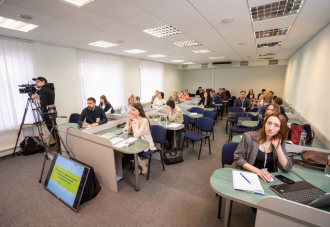The material was published in ShoTam
Planning to create an NGO? Get ready to run around government agencies, and if you’re lucky, you may get away with just two visits to the Administrative Services Center (ASC). However, sometimes luck alone is not enough, and therefore basic training will come in handy. Lawyer Nataliia Povtar told us what nuances we should be aware of when preparing to establish an NGO, how the process works and why it will be much more difficult to stop the activity.
Nataliia Povtar
Lawyer of the NGO Centre for Democracy and Rule of Law NGO
works in the Ukraine Civil Society Sectoral Support Activity
Helping to establish organizations
For a long time, I have been advising initiative groups of people who want to create an NGO or charitable organization. In particular, I deal with issues of legislative support for volunteers’ activity in Ukraine and organizations that engage them in their work. Therefore, I am well aware of the technical details of this process.
In a consortium with ISAR Ednannia and the Ukrainian Center for Independent Political Research, we are working on a component designed to improve legislation for the activities of civil society organizations in Ukraine.
Raising funds using your personal bank card? Think about establishing an NGO
Before establishing an NGO, one of the most important things to decide is whether there is really a need for it. It is necessary to analyze all pros and cons and come to an informed decision: whether it makes sense to establish a new legal entity or not.
It should be understood that a non-governmental organization is a legal entity whose activities are subject to a range of requirements and standards. In particular, you will be required to report to the tax authorities for the funds raised and spent, you will work with documents, conclude contracts.
If you realize that your activity is about “playing the long game”, then, of course, it is necessary to establish a legal entity, to determine the structure of governing bodies and the decision-making system.
Now, for example, the reason to register a legal entity may be more systematic work with fundraising and expenses for the needs of the Armed Forces of Ukraine. Fundraising through a non-profit organization rather than private card accounts is a more understandable approach for both government agencies and the people you’re encouraging to participate in fundraising.
Identify areas of work
People thinking about starting an NGO should first decide what areas they want to work on, which sphere they are planning to influence. This will help you understand what you really need: NGO or charitable organization, because there are differences between them.
In general, the list of areas of activity for NGOs can be quite extensive. The purpose of NGOs is to protect the rights and freedoms of people – economic, social, cultural and the like. This means that at the level of the articles of association you can detail and define completely different areas of work.
But, of course, the legislation and the Constitution of Ukraine clearly define what areas of activity and for what purpose NGOs cannot be established and operate. This is about the activities related to the elimination of Ukraine’s independence and its territorial integrity. Now these are also areas related to the propaganda of the Russian regime, the symbols of the invasion of Ukraine, etc.
This means that the articles of association of the NGO can not specify such areas. And if the law enforcement officers discover that de facto the organization is engaged in something prohibited, its activities can be terminated through the court, and all those involved will be held accountable for what has been done.
Choose the NGO status
An NGO can be registered as a legal entity or without such a status. First of all, the difference lies in the fact that in the first case it is possible to conduct full financial and business activities. An organization with a legal entity status has the right to open bank accounts, rent an office, engage volunteers in its activities, and apply for grants. This gives it more opportunities.
Talking about NGOs without the status of a legal entity, it is more about representing the interests of a certain group of people before the state bodies, declaring a common opinion on certain issues. Such an organization, for example, has the right to contact state authorities with a request for information. But, again, it cannot be a party to civil-law relations, acquire property and non-property rights, in accordance with the law, and, therefore, to raise funds for its activities and the like.
Prepare the necessary documents
You can prepare the necessary documents for NGO registration quite quickly, if you do not have a specific request for the articles of association or the structure of the governing bodies. You can use the standard sample documents available on the websites of the offices of the state registration departments and the Ministry of Justice.
Various initiatives, such as the Ukrainian Center for Independent Political Researchcan help with the preparation. They can advise you and check whether you have filled in the documents correctly. They can also help you with other related issues.
Allow enough time for document submission
In my opinion, the technical procedure for creating an NGO is quite simple and fast. It is legally defined that, within a three-day period, an organization that has submitted documents to the state registrar must receive a decision on the state registration of the organization or refusal to register the organization.
But, unfortunately, the process of registering an NGO is not automated, and the possibilities to register it online are rather limited. There is a certain functionality of the Online House of Justice, there is an opportunity to submit documents for NGO establishment. But this system requires at least some improvement.
Now our colleagues are working to ensure that in the future it will be possible to register NGOs through Diia. But for this purpose, it is necessary to work out the possibility of creating a certain “model articles of association for an NGO”, so that through the proposed options one can draft the articles of association and carry out state registration online.
So far, in almost all cases, the registration of NGOs requires you to go with printed hard copy documents to the ASC or the department of public formations registration.
At the first visit – you bring the documents, at the second visit – you pick up the extract or the decision on refusal. If something needs to be refined, you do it and go to the same ASC again. Therefore, the number of visits increases. But, if you are lucky and the second time you get the extract, then everything is fine, you can start working.
Visit a few more institutions to work fully
Talking about the entire set of actions that need to be performed to start an organization, then it is not only about obtaining an extract. There are also certain additional steps that ensure full-fledged work.
Say, it is very important that the organization submit an application to the register of non-profit institutions and organizations no later than 10 days from the date of registration. If the state registrar independently transfers this information to the STS, you will not even need to go to the State Tax Service. And yet, as a rule, you will have to go there several times. After all, access to the registers of state bodies and STS is often hampered because they system “crashes”, so the process can be delayed.
To find out whether you have been included in the register of non-profit institutions and organizations, you have to call the government authorities from time to time. This is necessary so that the organization does not pay tax on the income of entrepreneurs. It is important for your NGO to get into this register before the receipt of funds to the account.
In the second case, you will still need an electronic digital signature, which can be obtained by using the services of one of the qualified providers of electronic trust services, including the tax office, Diia and PrivatBank. You can choose the option that is most convenient for you.
Think through the contents of the articles of association
NGO must have at least two founders. As for the number of members, there are no restrictions here.
When filling out the registration application, the state asks for typical information – passport data of the founders, places of residence, taxpayer number data. This allows identifying an individual through the registers.
You also need to pay attention to the organization’s articles of association as the main document that will guide you in your work. It defines the fundamental issues related to future activities: the structure of the main bodies, the approach to decision-making, etc. Therefore, it is worth deciding what you plan to do in the future as early as at the stage of drafting the articles of association.
Organization members can introduce amendments to the articles of association if they so wish. Decisions on amendments to the articles of association can only be made by the general meeting as the supreme governing body of the NGO.
Therefore, it is necessary to submit the documents specified in Part 4 of Article 17 of the Law “On State Registration of Legal Entities, Individual Entrepreneurs and Public Organizations” to the same ASC or the Department of State Registration of Public Organizations, including the new version of the articles of association with the changes made. There are no restrictions on the number of actions to amend the articles of association. The process itself is neither simpler nor more complicated than the initial registration of the organization establishment.
Be aware of the difficulty of terminating an NGO
Both the establishment and termination of an NGO is free of charge. However, when you, for example, introduce amendments to the articles of association or information about the head, this is a paid service. In this case, you will pay an administrative fee each time.
Termination of an organization is a much more complicated procedure than its establishment. Therefore, once again, it is important to take a balanced approach to the decision to establish an organization. To terminate it, you need to collect more documents, go around more institutions. It is a multi-stage work with various state structures.
First, you must file a statement that you are starting the process of terminating the organization – registration of the decision to terminate the legal entity. This is a way to notify the state that the termination has begun so that, for example, the STS could schedule a “liquidation audit” of your organization.
In addition, you will need to deal with archival institutions, where you should transfer documents that are subject to long-term storage. There you need to get a certificate of acceptance of documents, which, according to the law, are subject to long-term storage.
And after that you can submit an application for the state registration of the termination of the legal entity, which is submitted with a certificate from the archival institution.
Take care of naming and branding
The name of an NGO cannot have the name of an organization already existing in Ukraine. For example, Free and Independent NGO may exist, and there may be Free and Independent LLC, but there cannot be two Free and Independent NGOs. Now they have already opened access to the Unified State Register, you only need to authorize through an electronic digital signature. There you can check if your desired name is not taken by some other organization.
In general, the NGO positioning through the name is often an important point. You have probably heard of cases where organizations try to take the name, branding, colors, fonts, etc. that are very similar to those of some well-known organization. These situations happen, and different organizations have different approaches to how to protect their brand and symbols.
The Law on Public Associations provides for the possibility of registering the NGO symbols. There is a legally defined procedure on how this can be done. But in fact there is no substantial responsibility for the use of symbols of other organizations.
There are organizations that register their symbols as a trademark. In general, all this is not related to the legislation that regulates the activities of NGOs, the legislation governing intellectual property rights will help here.
Plan and scale up
I would highlight a few key things to consider before setting up an organization. First and foremost, the decision must be an informed one. You must realize that this is a new legal entity for which you will be responsible. It requires systematic work to fulfill the purpose you declare.
The second point is to take care of recruitment. In addition to the management bodies and the head, who will take on the main burden of the organization’s work, every NGO should engage a qualified accountant who knows the specifics of the work of non-profit organizations. This can be either a hired employee or an outsourced service. It is important that this person helps you organize all financial work correctly.
I would also point out planning: try to set yourself a standard of performance that you need to achieve in order to make decisions about the continuation of the organization. In no way should an NGO become a vestige or some kind of problem in your life. It should be an effective tool designed to address the goals you set out to achieve when you started the organization.
Also, think about scaling whenever possible – it always helps. Setting big goals will help you succeed.
Also, don’t be afraid to ask for help. There are plenty of resources out there to help make sure your NGO is up and running. There are also a lot of programs where more experienced organizations help younger ones get things going. For example, my organization has a mentoring program for CSOs, which is specifically designed to strengthen the advocacy and other capabilities of young organizations. Look for these opportunities, because they are out there now.




